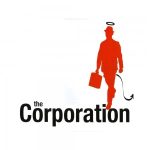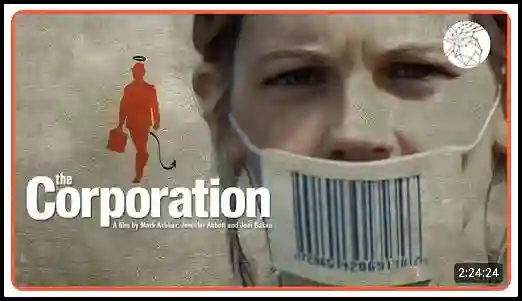The Corporation: Public Discussion on the Film
Over the last two film and curry nights at Serenity Cafe in Edinburgh, we have been watching the film The Corporation. Originally it started as a book by Professor Joel Bakan, who teaches law at the University of British Columbia. He examines the social, economic, and political dimensions of law winning a number of awards for his scholarship and teaching as well as having worked on landmark legal cases and government policy.

The film has been nominated for over 26 international awards and won the World Cinema Audience Award for Documentary at the Sundance Film Festival, the People’s Choice Awards Vancouver – Calgary – Toronto International Film Festivals; as well as winning the Joris Ivens Special Jury Award in Amsterdam International Film Festival.
On the back of the book the synopsis says: “What would the world be like if its rulers were insane ? The most powerful class of institution on earth, the corporation, is by any reasonable measure hopelessly and unavoidably demented.
The corporation lies, steals, and kills without hesitation when it serves the interests of its shareholders to do so. It obeys the law only when the costs of crime exceed the profits. Corporate social responsibility is impossible except in so far as it is insincere.
At one a diagnosis and a course of treatment, The Corporation is essential reading for those who want to understand the nature of the modern business system. Based upon a rigorous account of the corporation’s legally structured nature, it is a sober and careful attempt to describe the world as it is, rather than as corporate public relations departments would have us believe it to be.
Although a billion dollar industry is trying to convince you otherwise, the corporations that surround us are not our friends. Charming and plausible though they are, they can only ever see us as resources to be used. This is the real world, not science fiction, and it really is us or them.”
The six chapters of book are:
- The Corporation’s Rise to Dominance
- Business as Usual
- The Externalizing Machine
- Democracy Ltd
- Corporations Unlimited
- Reckoning
The documentary takes us through the journey of the development of the modern corporation where it started as a legal entity developed as a government-chartered institution. This legal entity was designed to support specific public functions such as the creation of a bridge over a river to connect two towns; the need to incorporate many smaller businesses (i.e. engineers) to engage in a task larger than any one of them can perform so that the public good could be met was the driving force for the creation of the corporation.
The corporation holds at its very heart the notion of shareholder primacy – that is, that the profit which is paid out to its shareholders takes presidence over every other aspect of its behaviour. This is legally enshrined in the Chief Executive Officer’s fiduciary responsibility to maximise profit to its shareholders.
This attitude was famously articulated in the case of Dodge v. Ford Motor Co, where Henry Ford testified to his belief that the company made too much money and had an obligation to benefit the public and the firm’s workers and customers. The Dodge Brother’s argument of an ‘improper altruism’ was upheld by the court stating: “A business corporation is organized and carried on primarily for the profit of the stockholders”.
Over many decades, the modern corporation acquired many of the rights – but not the responsibilities – of an individual person. In the documentary Bob Monks identifies the legal structure as one of “an externalising machine” – that is, one which draws close benefits whilst pushing away responsibility. The economic idea of externalities is a helpful way of understanding the impacts and behaviours of a company. An externality is the cost or benefit which affects a party who did not choose to incur that cost or benefit.
With the use of the legal powers associated with corporations, the documentary tracks behaviours which are compared to the Hare Psychopathy Checklist.. The film uses various examples to illustrate antisocial behaviours which become manifest in these business superstructures. Some examples in the film are:
- The use of sweatshop labour by Nike and famous brands such as Kathie Lee Gifford
- The suppression of an investigative news story about Bovine Growth Hormone on a Fox News Channel affiliate television station at the behest of Monsanto
- The creation of the Fanta by the Coca-Cola Company due to trade embargos on Nazi Germany
- The purported role of IBM in the Nazi holocaust
- The Cochabamba protests of 2000 brought on by the privatization of water in Bolivia
The documentary illustrates the way that corporations are compelled to behave and matches up sections against the following checklist:
- The callous disregard for the feelings of other people
- The incapacity to maintain human relationships
- The reckless disregard for the safety of others
- The deceitfulness (continual lying to deceive for profit)
- The incapacity to experience guilt
- The failure to conform to social norms and respect the law
An interesting aspect of the film is the various interviews it has with CEO’s (Chief Executive Officers) of large corporations which helps illustrate the issue that the governance structures are out of control. People inside the companies seem to be relatively helpless to make important changes for moral and public reasons. You can read an interview with Joel Bakan ten years after the original release of The Corporation here:
Interview with Prof Joel Bakan
At the Ragged University Film and Curry nights, we watched the film in two parts and recorded the conversation after we had our vegetarian curry.
The New Corporation
Since the production of Joel Bakan’s original book and film, he and others have written a second book and the development of a second film – “With CEO compensation soaring, income inequality at all-time highs, the planet facing ecological disaster, and democracy in a precarious situation, Joel Bakan and Jennifer Abbott have again teamed up to make the movie The New Corporation: The Unfortunately Necessary Sequel”. Here is a webinar which was produced on this further development of a critical view of the activity of corporations in the world:


